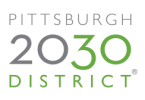ONEPGH Identifies Tangible Actions for City to Address Urbanization, Globalization and Climate Change to Create a More Viable, Sustainable, Livable, & Prosperous City
March 8, 2017, – Today, Pittsburgh Mayor William Peduto and 100 Resilient Cities – Pioneered by The Rockefeller Foundation (100RC) unveiled ONEPGH, Pittsburgh’s first-ever comprehensive Resilience Strategy. This new roadmap addresses Pittsburgh’s most pressing and interconnected challenges that weaken the fabric of the city on a day-to-day and long-term basis, including inequity, public health, aging infrastructure, flash floods and other severe weather events.
Drawing on the strength of Pittsburgh’s unique communities and geographies, as well as existing city-wide resilience initiatives, ONEPGH focuses on the bold vision of engaging neighbors to make Pittsburgh livable for all its residents. The basis of the framework builds on the City’s adopted “p4” values – a holistic, community-centered approach that emphasizes People, Place, Planet and Performance.
The full ONEPGH strategy is available here.
Through these tactics, Pittsburgh will look to:
- Empower all residents to contribute to their communities by ensuring that basic needs are met and that all residents have equitable access to resources and opportunity;
- Use city land to benefit all residents and address issues of social cohesion, connectivity and public and ecological health to protect against current risks; while designing, scaling and maintaining infrastructure to meet current and future needs;
- Achieve long-term environmental health through improved use of resources and a reduced carbon footprint;
- Work closely with government and nongovernmental partners for improved planning and decision-making.
“The Resilience Strategy puts into practice a basic principle – our city can only move forward if we move forward as one Pittsburgh,” said Mayor Peduto. “Through implementation of ONEPGH, we have an opportunity to not only show the strength of our resilient past, but help illustrate to other cities how to navigate their own 21st century challenges.”
Grant Ervin, Pittsburgh’s Chief Resilience Officer said, “Pittsburghers are passionate about their city and their neighborhoods. This connection, which goes beyond a physical space, will be one of the city’s greatest strengths as we coordinate, amplify and accelerate our existing resilience work as a member of the 100RC global network.”
In addition to the innovative approaches lead by the City, 100RC has challenged Pittsburgh’s philanthropic and private sectors to contribute to implementing actions within the strategy.
“ONEPGH highlights Pittsburgh’s role as a resilience leader both in this region and across the world,” said Andrew Salkin, Senior Vice President, 100RC. “We look forward to continuing to work with Pittsburgh as it tackles dynamic 21st century challenges with a committed public sector and an active and engaged citizenry.”
The city’s Resilience Strategy was developed in partnership with the public, private, and nonprofit sector, along with Pittsburgh community leaders and stakeholders. It comes with commitments for implementation from 100RC Platform Partners such as Fourth Economy, a consultancy that has provided the City with tactical recommendations around the planning and implementation of various resilient efforts, and other local and national philanthropic organizations. The City will also have continuing access to a $200 million-plus pool of tools and services from the 100RC Network and platform partners.
In December 2014, Pittsburgh was selected as part of the second cohort to join the 100RC network, which includes a diverse group of global cities from Los Angeles to Chicago, London, Paris, Rotterdam, Bangkok, and Accra. More than 1,000 cities have applied to join 100RC since its inception.
The full ONEPGH strategy is available here.
###
About 100 Resilient Cities
100 Resilient Cities -Pioneered by The Rockefeller Foundation (100RC) helps cities around the world become more resilient to social, economic, and physical challenges that are a growing part of the 21st century. 100RC provides this assistance through: funding for a Chief Resilience Officer in each of our cities who will lead the resilience efforts; resources for drafting a Resilience Strategy; access to private sector, public sector, academic, and NGO resilience tools; and membership in a global network of peer cities to share best practices and challenges. For more information, visit: www.100ResilientCities.org.







